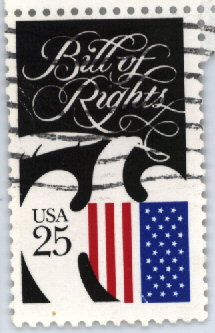The Bill of Rights
The First 10 Amendments to the Constitution and Their PurposeProtections Afforded Fundamental Rights and Freedoms
- Amendment 1: Freedom of religion, speech, press, and assembly; the right to petition the government.
Protections Against Arbitrary Military Action
- Amendment 2: Right to bear arms and maintain state militias (National Guard).
- Amendment 3: Troops may not be quartered in homes in peacetime.
Protection Against Arbitrary Police and Court Action
- Amendment 4: No unreasonable searches or seizures.
- Amendment 5: Grand Jury indictment required to prosecute a person for a serious crime. No "double jeopardy" -- being tried twice for the same offense. Forcing a person to testify against himself or herself prohibited. No loss of life, liberty or property without due process.
- Amendment 6: Right to speedy, public, impartial trial with defense counsel, and right to cross-examine witnesses.
- Amendment 7: Jury trials in civil suits where value exceeds 20 dollars.
- Amendment 8: No excessive bail or fines, no cruel and unusual punishments.
Protections of States' Rights and Unnamed Rights of the People
- Amendment 9: Unlisted rights are not necessarily denied.
- Amendment 10: Powers not delegated to the United States or denied to states are reserved to the states or to the people.
 The Bill of Rights was ratified in 1791, but its application was
broadened significantly by the 14th Amendment to the
Constitution, which was ratified in 1868. A key phrase in the
14th Amendment -- "nor shall any state deprive any person of
life, liberty or property without due process of law" -- has been
interpreted by the Supreme Court as forbidding the states from
violating most of the rights and freedoms protected by the Bill
of Rights.
The Bill of Rights was ratified in 1791, but its application was
broadened significantly by the 14th Amendment to the
Constitution, which was ratified in 1868. A key phrase in the
14th Amendment -- "nor shall any state deprive any person of
life, liberty or property without due process of law" -- has been
interpreted by the Supreme Court as forbidding the states from
violating most of the rights and freedoms protected by the Bill
of Rights.
